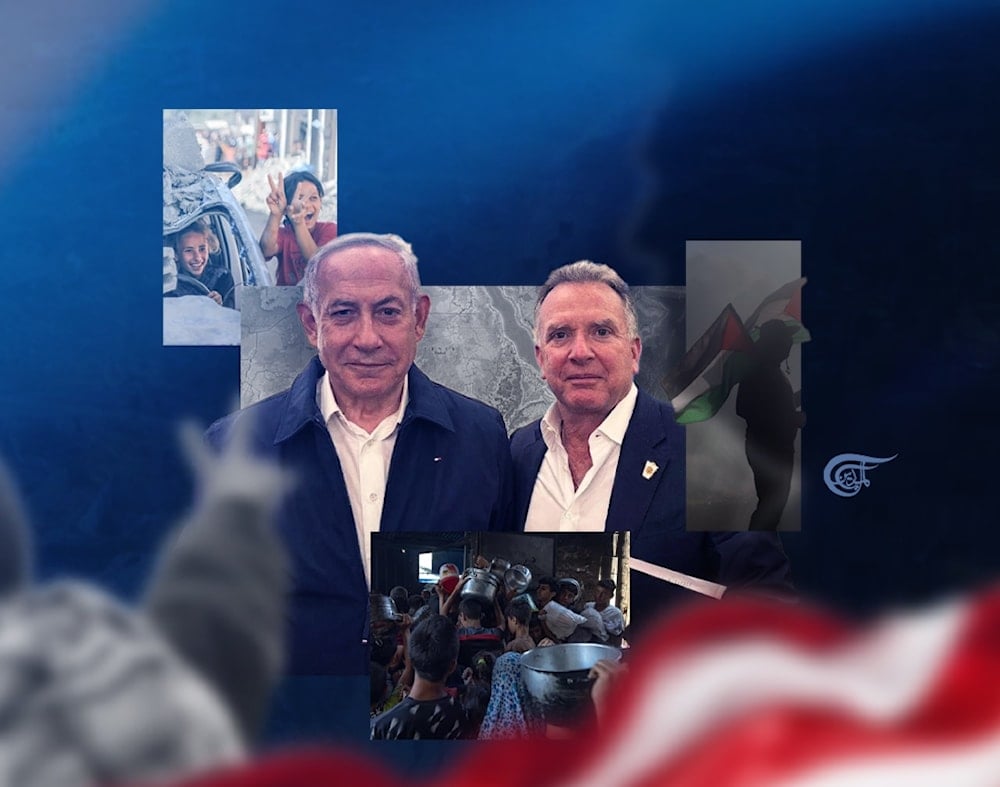Witkoff’s proposal and the position of the Palestinian Resistance
Amro Allan explains how the latest US ceasefire proposal, lacking any binding commitments, was seen by the Palestinian Resistance as a deceptive ploy to stall, rather than end, the war on Gaza.
-

The Palestinian Resistance’s insistence on solid guarantees for a permanent ceasefire remains the most responsible and strategic course of action. (Al Mayadeen English; Illustrated by Zeinab El-Hajj)
The latest US manoeuvre, involving Witkoff’s proposal, amounted to little more than an attempt at deception. Washington fed the Palestinian negotiator, via a third party, false assurances that the American president was preparing a new ceasefire initiative that would, in time, lead to a permanent end to “hostilities.” Yet the actual paper handed to Palestinian representatives contained no explicit or implicit commitments to ending the war. It was devoid of any language pointing to a final resolution, raising suspicions that the proposal was merely a tactical distraction.
This move appears aimed at dragging Palestinian negotiators back into the failed framework of interim agreements, similar to the one signed on 15 January 2025. That agreement quickly collapsed within weeks of taking effect, largely due to “Israel’s” refusal to pursue a genuine and lasting ceasefire in Gaza. History has shown that such deals serve as breathing space for the Israeli Occupation Forces, not as steps toward justice or peace.
The lesson drawn from these past experiences is now clear: “Israel’s” goal is to retrieve its captives, without stopping the bloodshed in Gaza. In that context, the Palestinian Resistance’s firm rejection of any renewed engagement in such phased arrangements is both prudent and principled. Interim agreements, in their current form, offer nothing more than a temporary pause in violence while enabling “Israel” to regroup and resume its military campaign. Far from ending the assault, they embolden “Israeli” aggression, escalating the violence and deepening the suffering of the people of Gaza.
Meanwhile, growing international pressure on “Israel” to halt its offensive, now coming even from traditionally staunch allies like Germany, the UK, and France, has emerged as a new source of leverage for Palestinian negotiators. These governments, long complicit in “Israel’s” war effort through arms sales and diplomatic cover, are facing increasing public outrage over their role in what many now aptly describe as a campaign of genocide.
Principally, the relentless armed resistance led by Hamas and other factions has so far thwarted “Israel’s” declared and undeclared military goals. For many observers, the war has become not only a strategic failure but a political liability. “Israel’s” campaign has descended into indiscriminate vengeance, punishing civilians through siege, starvation, and airstrikes, while failing to achieve any measurable gains on the battlefield. For Western governments, the images of mass civilian casualties have become politically toxic, undermining the very alliances that once protected “Israel” from international accountability.
In the background stands the United States. President Trump, whose grasp of military and strategic affairs is notoriously thin, had initially assumed that the conflict would be resolved quickly. Weeks, he thought, not months. But Washington is now confronted with the undeniable reality that “Israel’s” military has failed to deliver. Add to that its inability to subdue Yemen earlier in the conflict, and the White House now finds itself negotiating from a position that has to take into account reality on the ground, not Trump’s flawed assessment. These developments provide the Palestinian Resistance with additional cards to play, ammunition in its bid to demand an end to the war and tangible relief for Gaza’s besieged population.
Despite the spin from Washington, portraying partial agreements as “pragmatic steps” or “the only viable path,” the facts on the ground tell a different story. Such deals do not pave the way for lasting peace; they prolong the war, reward bad faith, and dilute the Palestinian demand for justice into a series of endless, unenforceable truces. This is not a roadmap to peace, it’s a detour designed to wear down the will of a people under siege.
For these reasons, and in light of shifting political dynamics both regionally and globally, the Palestinian Resistance’s insistence on solid guarantees for a permanent ceasefire, prior to entering into any temporary deal, remains the most responsible and strategic course of action. It is a stance grounded not in rejectionism, but in the hard-earned wisdom of experience. And it may be, at this moment, the clearest path forward in a world finally beginning to question the cost of silence.

 Amro Allan
Amro Allan
 4 Min Read
4 Min Read











